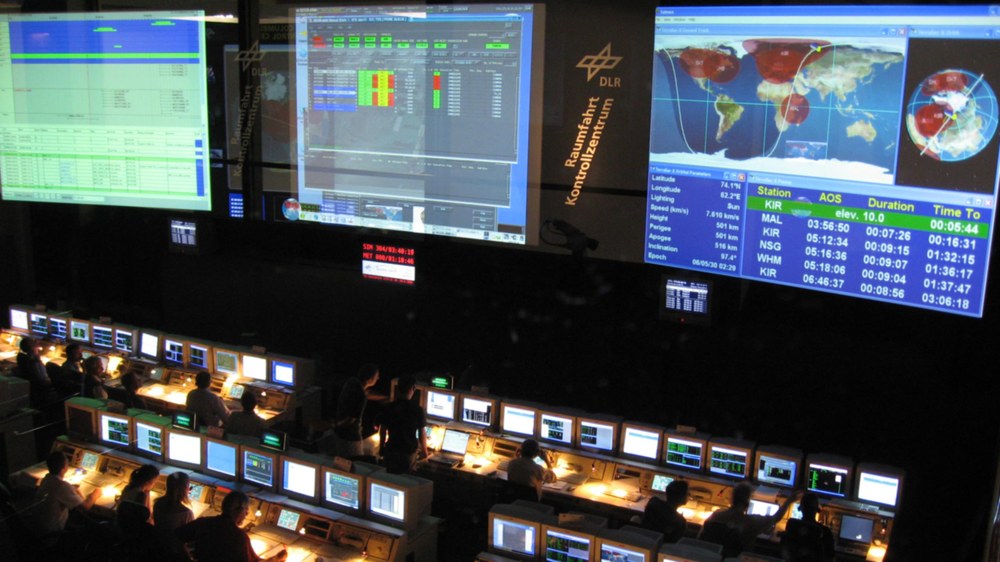Preparations nearly complete at the German Space Operations Center



Focus: Space
The final preparations for the launch of the EDRS-C satellite are currently underway at the German Space Operations Center (GSOC) in Oberpfaffenhofen. The communications satellite is scheduled to lift off from the European Spaceport in French Guiana on 6 August 2019 and will be a core component of the European Data Relay System (EDRS) – the 'space data highway'. Using satellite-based Laser Communications Terminals (LCTs), EDRS can transmit large amounts of data from space to Earth in a very short time. The German Aerospace Center (Deutsches Zentrum für Luft- und Raumfahrt; DLR) and GSOC are responsible for operating the EDRS-C satellite, the EDRS payloads and the ground stations.
Approximately 100 GSOC staff members have been deployed for the EDRS-C ground segment – from staffing the control room in Oberpfaffenhofen to the provision of IT infrastructure and support for the ground station in Weilheim. The mission operations for the overall system are conducted at the premises of Airbus Defence and Space in Ottobrunn.
The data relay system is based on two geostationary satellites that act as distributors and transmit data from Earth observation satellites in low Earth orbit to ground stations in Europe. This makes data rates of up to 1.8 gigabits per second possible. For the management of the 'intersatellite links', the data links between the satellites, GSOC uses its own software: "We are particularly proud of the development of a fully automated system that accepts, processes, optimises and monitors the planned links. This enables each shift to establish up to 100 connections per relay satellite and to carry out parallel maintenance and, if necessary, error analyses," explains Felix Huber, Director of DLR Space Operations and Astronaut Training. With the ERDS-A distribution node, launched in 2016, more than 23,000 intersatellite links with an availability of more than 99.8 percent have already been realised.
Datalinks, antennas and orbital manoeuvres
GSOC is responsible for the EDRS 'ground segment'. Oberpfaffenhofen operates the satellite control centre for EDRS-C as well as controlling the payloads for EDRS-C and EDRS-A. The payload on board the satellites consists of the LCTs for receiving the data as well as Ka-band antennas for forwarding the data to the receiving antennas on the ground. In total, the receiving network consists of four antennas, which are procured by GSOC and operated remotely. The two primary EDRS antennas are located at DLR's ground station in Weilheim, Germany, and are supplemented by one antenna each in Redu, Belgium and Harwell, England.
In recent weeks and months, the operations specialists have set up and tested the ground systems and trained for mission operations in various simulations. Over the next few days, GSOC will commission the new ERDS-C satellite together with a team of engineers from satellite manufacturer OHB System in Bremen, Prime Contractor Airbus Defence and Space and the European Space Agency (ESA) – one of the main clients for the project.
"Following the lift-off of the Ariane 5 launcher and the injection of the satellite into a geostationary transfer orbit, the first step is to obtain a stable connection with the satellite. At the beginning, this is the biggest challenge for establishing safe satellite operations," explains EDRS Project Manager Ralf Faller from GSOC. The first contact will be followed by an intensive test phase. Over a period of several weeks, the 12-member control room team will also perform various orbit correction manoeuvres to ensure that the satellite reaches its final orbital position and can commence service.
GSOC will provide satellite operations and data relay services for 15 years. GSOC will also support the further development of the EDRS infrastructure and will use the data highway for its own Earth observation satellites.
EDRS ground segment
EDRS is a public-private partnership between the ESA and Airbus Defence and Space. DLR invested 8.7 million euro from its research funds in the development of the complete EDRS ground segment and the preparations for its operation. The Bavarian Ministry of Economic Affairs, Regional Development and Energy provided 7.5 million euro.
